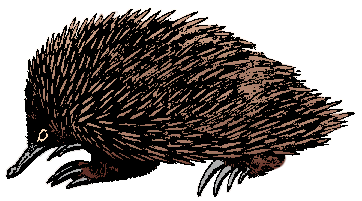: a spiny-coated toothless burrowing nocturnal monotreme mammal (Tachyglossus aculeatus) of Australia, Tasmania, and New Guinea that has a long extensible tongue and long heavy claws and that feeds chiefly on ants
also
: several related mammals (genus Zaglossus) of New Guinea having a longer snout and shorter spines
Subscribe to America's largest dictionary and get thousands more definitions and advanced search—ad free!
Merriam-Webster unabridged
